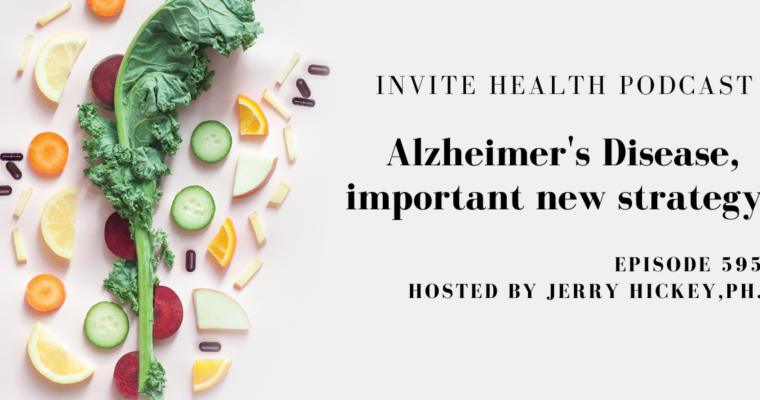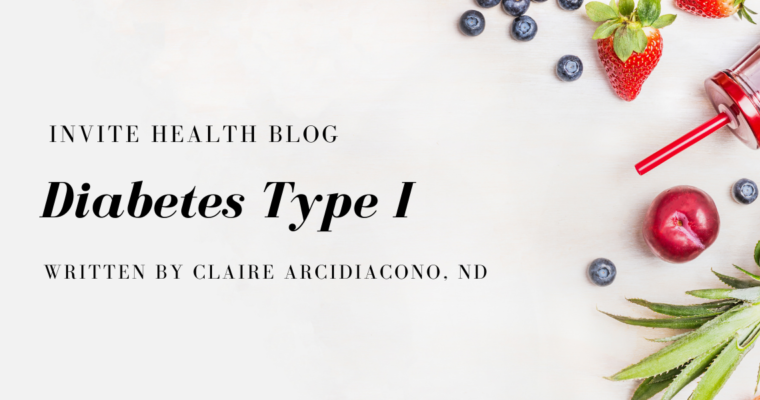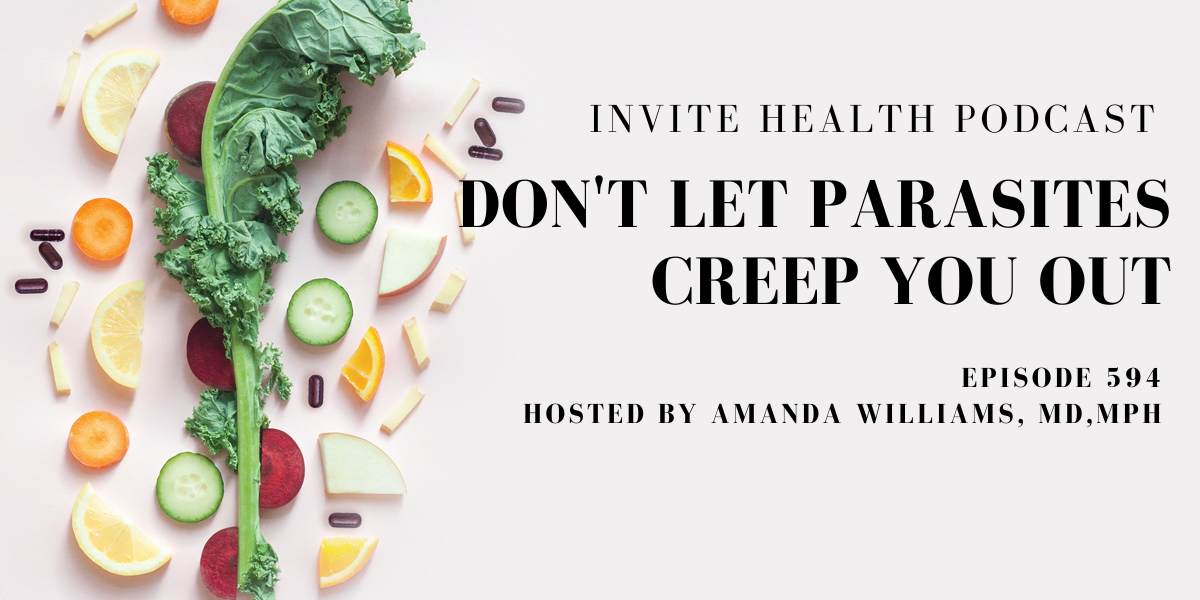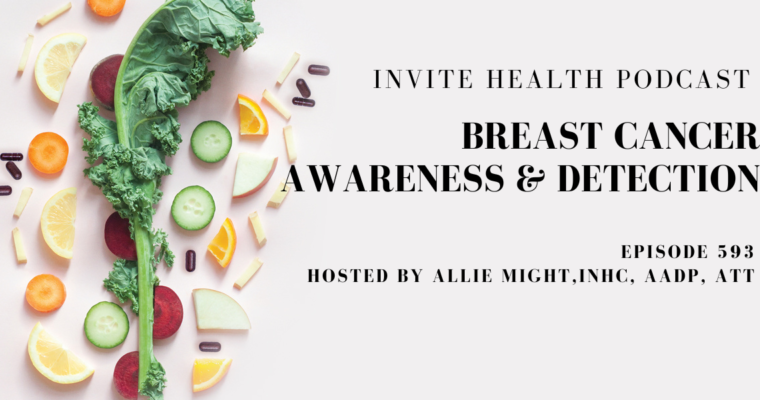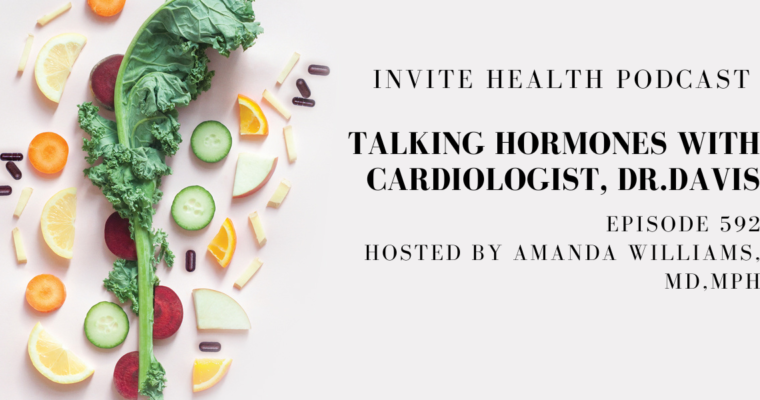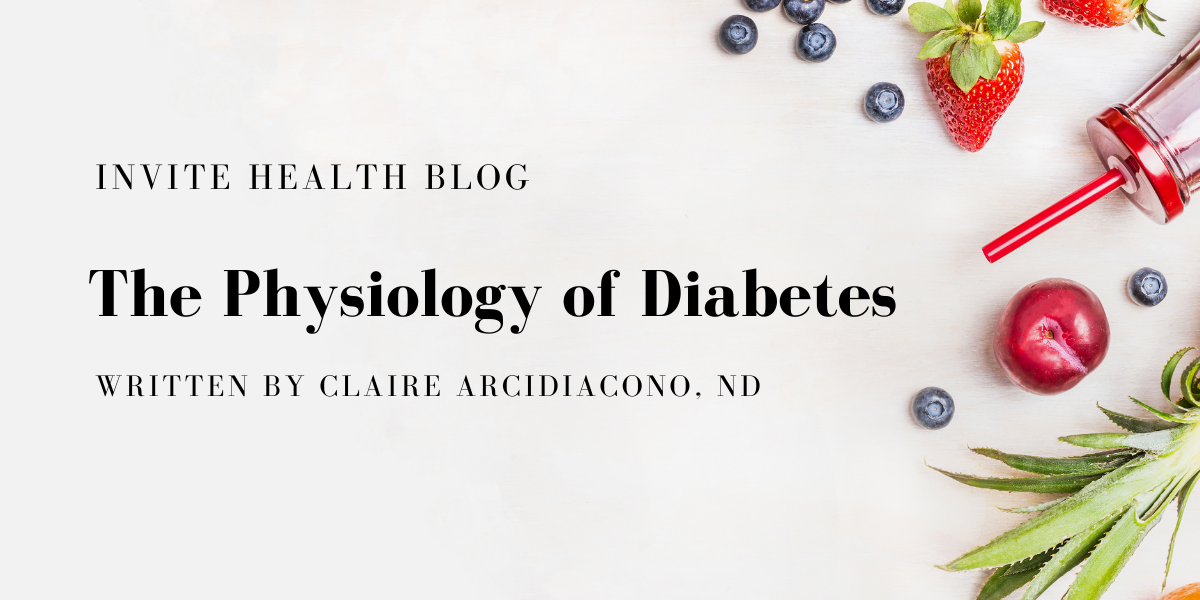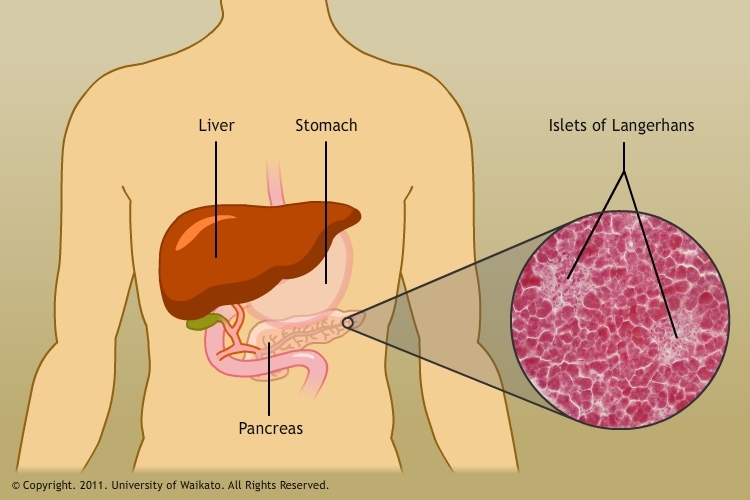Subscribe Today!
Please see below for a complete transcript of this episode.
Hosted by Amanda Williams MD, MPH

*Intro Music*
InViteⓇ Health Podcast Intro: [00:00:04] Welcome to the InViteⓇ Health Podcast, where our degreed health care professionals are excited to offer you the most important health and wellness information you need to make informed choices about your health. You can learn more about the products discussed in each of these episodes and all that Invite Health has to offer, at www.invitehealth.com/podcast. First time customers can use promo code podcast at checkout for an additional 15% off your first purchase. Let’s get started.† [00:00:34]
*Intro Music*
Amanda Williams MD, MPH: [00:00:40] There are so many things about the human body that are absolutely amazing and maybe even inspire you to want to learn more about how does that work or how does this function? And then there are probably things that you’ve heard about where you go, oh, I wish I didn’t know that. And that’s what I want to talk about today. Those things that make you cringe a little bit and make you say, I don’t want to even imagine that, that can happen in a human. And yes, it can. So I am Dr. Amanda Williams, scientific director at InViteⓇ Health. And we know that when it comes to creepy crawlies, we should pay attention to those. Most people think about the common cold having the flu, different viruses, of course, bacterial infections, that most people have heard about, E coli, salmonella, maybe MRSA, which we know is, certainly, not a fun experience if someone has ever been diagnosed with Methicillin Resistant Staph Aureus, very hard to treat. But we also can’t overlook parasites. Now, what’s interesting about parasites, is people usually think about the worst case scenario, maybe, something that you saw on TV about this massive tapeworm that took over a human body, or you see some movie, or TV show, or maybe it’s even a science special where they actually show pictures of a tapeworm that is attacking a human. And that’s not the normal. But when it comes to microscopic parasites, this is something that’s actually very common, which is why I often tell folks it would be incredibly advantageous to do a nice little light cleanse of your body a couple of times a year. And we can achieve this through the use of different nutrients, different herbal extracts that we know make it inhospitable or uncomfortable for those parasites to thrive. But at the end of the day, we cannot overlook that parasites exist in human hosts are very common. They have estimated that upwards of 80%,80% of humans are infected with parasites. Yes, parasites living inside of you.†[00:02:57]
[00:02:58] Now, the majority of people who have parasites that are hanging out, going for the ride with you every day. They’re not making you sick. You are completely asymptomatic, so you probably don’t even know. Now, how did you get it? Maybe drinking water, from food. There’s many different sources. Certainly it can be passed from person to person, different parasites. There are different types of parasites. There’s roundworms, there’s hookworms, of course, there’s tapeworms. And when it comes to different symptoms that people can experience, most people want to think about, you know, Montezuma’s revenge and, you know, having explosive diarrhea. This isn’t always the case. Of course, if we are infected by a very powerful intestinal parasite, we can experience abdominal cramping, diarrhea, foul smelling, gas, indigestion, bloating, all of these we certainly can relate to those stronger types of pathogens, or parasites. But we can have these other types of parasites that affect us, that maybe aren’t really making us sick, but yet it’s so common.† [00:04:07]
ICYMI: DIGESTIVE HEALTH PART 6: DIARRHEA>>READ NOW!
[00:04:08] We can look at those living in the United States and we know that more than 60 million Americans are chronically infected with Toxoplasma Gondii. That is, the parasite that causes toxoplasmosis. Does that mean that most people who have Toxoplasma gondii in their system are going to end up with a severe case of toxoplasmosis? Certainly not. But we do know that this is very common when they tell pregnant women, for example, that they shouldn’t be cleaning cat pans because this is a potential source of exposure to Toxoplasma Gondii. So we know that these parasites exist. We know that most parasitic infections can be prevented, and many are very treatable. So even if you have a severe parasitic infection, often times through traditional medicine, there are different remedies. But we also know that just on a day to day basis there are things that we should be doing when it comes to our intestinal health. Supporting our immune system is always first and foremost. A lot of these parasites are very tricky and they actually build their own little biofilm, so it makes it hard for our immune system to rid itself of them. But we know that there are different herbs that those parasites don’t like so much. And I’m going to talk about those because we have two different formulations. We have our Para hx and we have our Nutrastatin 144. Both of these I think are wonderful formulations to add in to your routine, maybe two times a year, maybe you take these products for two weeks, maybe four weeks, a couple of times a year. Think about this just for a moment, whenever someone gets a new puppy, or a new kitten, one of the first things that you do, is you take it to a vet and that vet gives you a de-wormer. So we know that we have to de-worm our puppies and our kittens. We also know that throughout the country, all livestock gets de-wormed and it’s actually done in different times of year in different parts of the country. So maybe up in the northeast they they de-worm the livestock in the fall and maybe in the south, they de-worm them in the spring. But we know that all of these animals are getting de- wormed. So we would be kind of foolish if we thought us as humans, do not require the same type of deworming.†[00:06:35]
[00:06:36] Actually, in many Latin and South American countries, people oftentimes go through, you know, an annual de-worming where they go off to see their doctor and they get medication to try and help rid the body of any parasites that may be kind of lingering around, because what we know about parasites is, even though it may be asymptomatic, if our immune system takes a hit in another way, so you get very ill with the seasonal flu, and it can be at that moment that that parasite really starts to thrive and take over, creating problems for you. Maybe joint pain, maybe fatigue, maybe just constant GI discomfort. So we always want to be able to avoid those scenarios.† [00:07:22]
[00:07:23] They did a really interesting study many years ago, where they were looking at these stool samples of folks who lived throughout the United States. So they tested stool samples in all 50 states. This was published in the American Journal of Tropical Medicine Hygiene, and they found that out of all of the different samples that they did, and they did close to 6000 stool samples that, almost every single one of those stool samples indicated that there was at least one parasite found in the stool, but multiple samples actually came back with anywhere from 2 to 4 ,different types of parasites. So we know this is something people don’t like to think about, but we always have to kind of go back and imagine that little puppy or that little kitten and they need de-worming so of course, we likely need it too. So this is when we turn to different nutrients. And we certainly can, we can look at something like the Colon Hx, for example, which has the psyllium fiber along with the bentonite clay. That’s an excellent choice to utilize a couple of times throughout the year for overall cleansing, one could say of our intestines. But I also really like to zero in on the Para Hx as well as the Nutrastatin 144.† [00:08:42]
[00:08:44] The Nutrastatin 144 contains different nutrients that really make an environment that parasites do not enjoy. It has caprylic acid coming from coconut oil, it has garlic extract, grapefruit seed extract, as well as peppermint. So very beneficial for the upper GI as well as for intestinal health. We can see how this targets issues with candida overgrowth, but certainly, these different nutrients have also been shown to be highly effective when it comes to parasites. And who wants to think about carrying around, you know, a bunch of parasites along with the 2 to 4 pounds of bacteria that you’re already carrying around with you. So this is where the Nutrastatin 144 can certainly be incredibly beneficial.† [00:09:30]
[00:09:32] Looking at peppermint leaf extract, there was a study done back in 2014, published in the Journal of Immunobiology, looking at how the peppermint leaf extract was very, very targeted towards parasites. And they found that the treatment of the parasitic infection with the use of peppermint leaf extract was significant, they saw the significant decrease in the eggs when they were looking at the the the stool samples. So after giving these folks, who had parasitic infections, peppermint leaf extract, they could see that level of new parasite formation starting to decline. So that’s definitely a very good thing.† [00:10:19]
DIGESTIVE HEALTH PART 13: SIBO>>READ NOW!
[00:10:20] And then we look at the the Para hx, which is once again a very wonderful formulation containing wormwood extract, goldenseal extract, black walnut extract, all different herbs that have been shown and studied, for targeting parasites specifically, and knowing that we have so many folks who are walking around unbeknownst to them, carrying these different types of parasites, it would certainly be advantageous to at least be proactive, and say, you know, I think maybe this is the the time of year that I’m going to just do my my light parasitic cleanse and I’ll use the Nutrastatin 144 and partner that up with the Para Hx and maybe do this for two weeks, maybe it’s for a full month. But we do need to be proactive when it comes to boosting up our immune defenses supporting our intestines, and making sure that we are not leaving ourselves open to be run over in a sense by any type of a pathogen, whether that be candida overgrowth, a bacterial overgrowth, or when it comes to those pesky little parasites, so I wanted to bring this to your attention.† [00:11:31]
[00:11:32] If you have questions in regards to, you know, how do I take these different products? How often should I take them? Then you definitely want to reach out to one of our nutritional experts. Remember, they’re available 7 days a week. It’s a free service. I cannot encourage you enough to take advantage of that. And, you know, ask them those questions. Ask what should I do? How often should I take? And they will be able to guide you through that process.† [00:11:57]
[00:11:58] I want to thank you so much for tuning in to the InViteⓇ Health Podcast Remember, you can find all of our episodes for free wherever you listen to podcasts or by visiting InViteHealth.com/podcast. Do make sure that you subscribe and you leave us a review. You can follow us on Facebook, Twitter, and Instagram at inVite Health. And we will see you next time for another episode of the InViteⓇ Health Podcast.† [00:11:58]
*Exit Music*


